BSc BMP3004 World of Work: Examining Functional Areas of Business
VerifiedAdded on 2023/06/16
|9
|2333
|165
Report
AI Summary
This report provides a detailed overview of the functional areas of business, including marketing, human resource management, customer service, finance, research and development, and sales. It defines what a business is and the importance of each functional area in achieving organizational goals. The report also describes the types of skills needed by employees to work effectively in each area, such as marketing employees needing digital promotion and creative management expertise, HR employees requiring training and brainstorming skills, customer service employees needing communication and multilingual skills, finance employees needing analytical and problem-solving skills, R&D employees needing technical vision and innovation skills, and sales employees needing competitive and strategic thinking skills. The report concludes that these functional areas are integral to a business's overall growth and success.
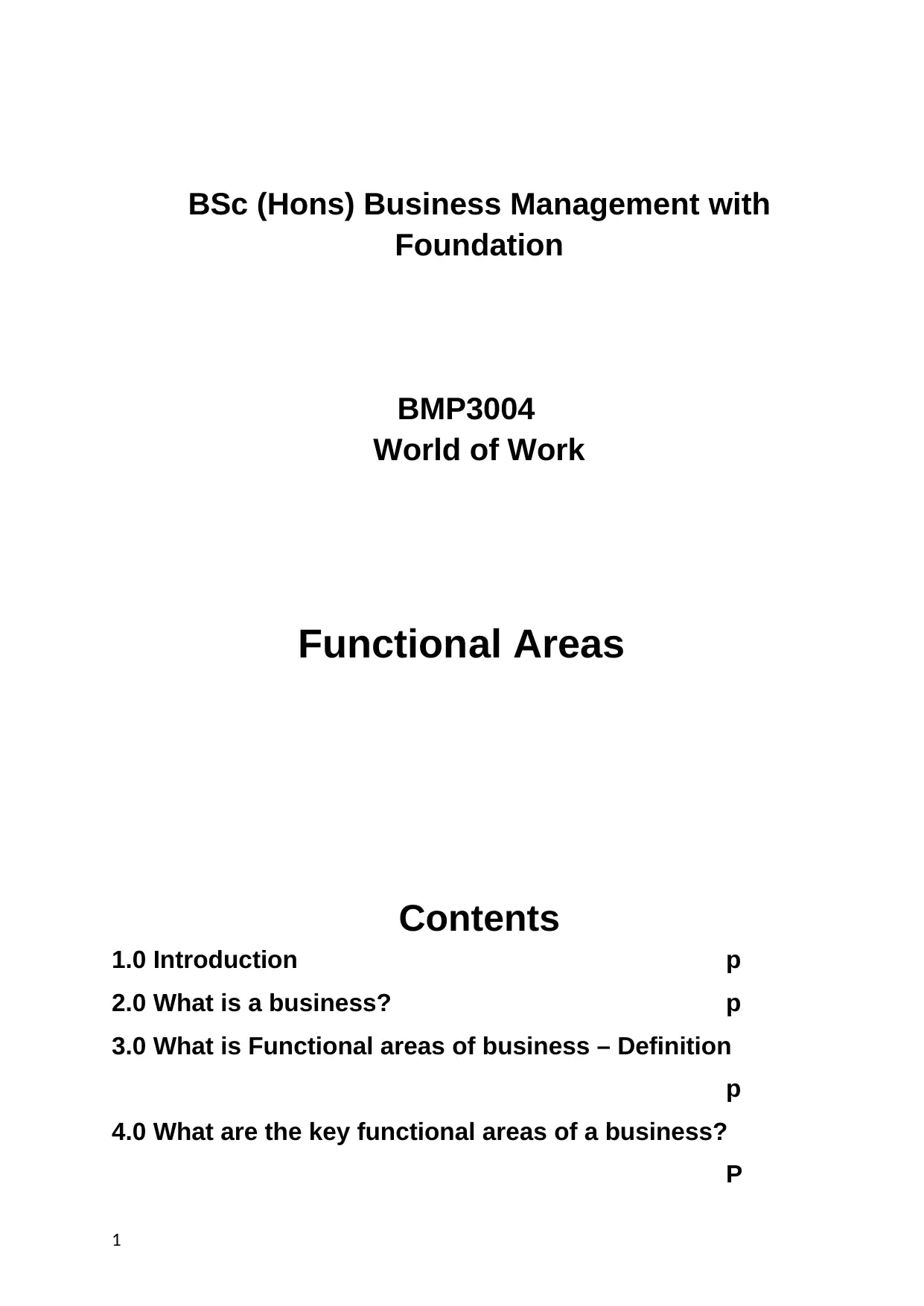
BSc (Hons) Business Management with
Foundation
BMP3004
World of Work
Functional Areas
Contents
1.0 Introduction p
2.0 What is a business? p
3.0 What is Functional areas of business – Definition
p
4.0 What are the key functional areas of a business?
P
1
Foundation
BMP3004
World of Work
Functional Areas
Contents
1.0 Introduction p
2.0 What is a business? p
3.0 What is Functional areas of business – Definition
p
4.0 What are the key functional areas of a business?
P
1
Paraphrase This Document
Need a fresh take? Get an instant paraphrase of this document with our AI Paraphraser
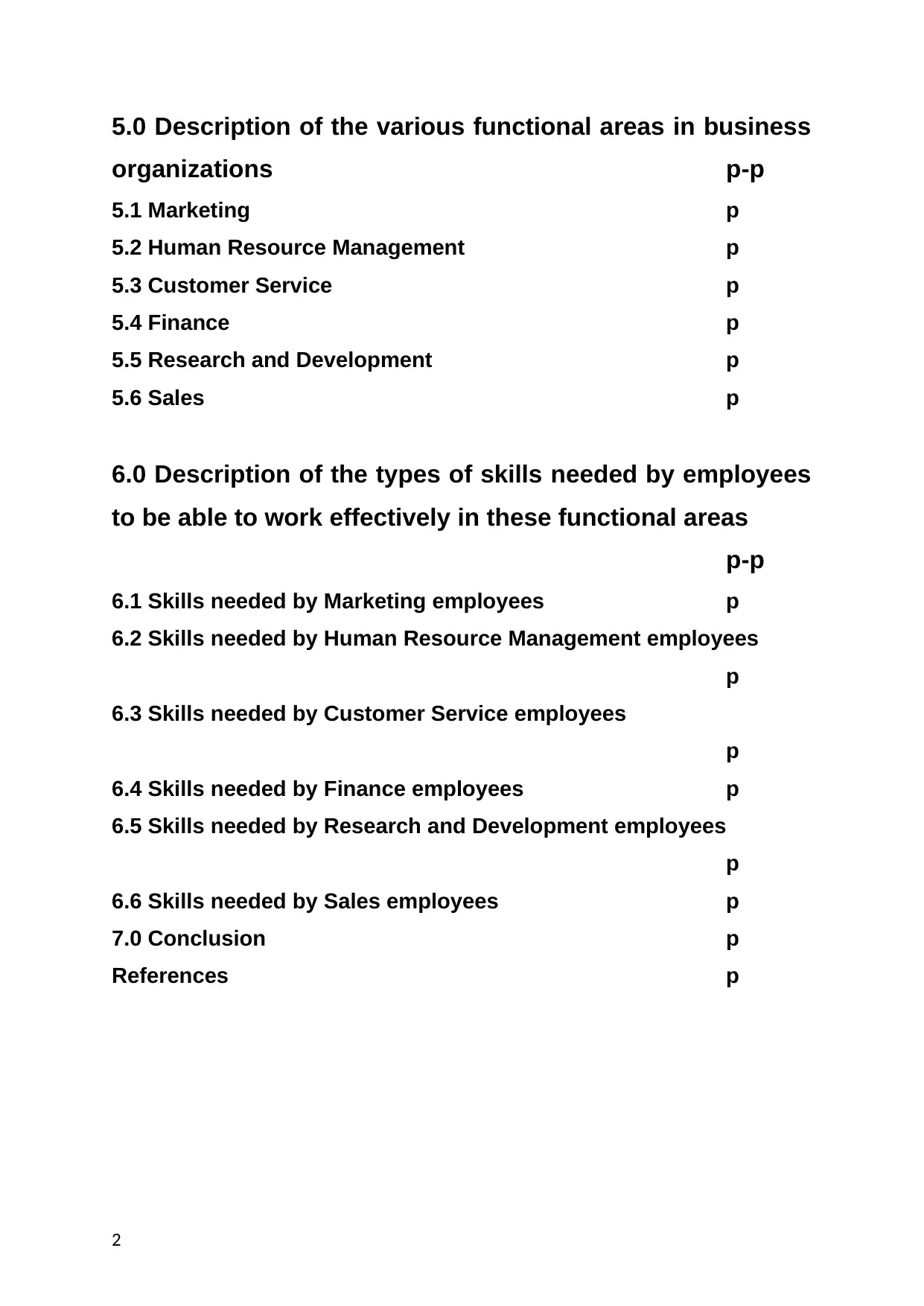
5.0 Description of the various functional areas in business
organizations p-p
5.1 Marketing p
5.2 Human Resource Management p
5.3 Customer Service p
5.4 Finance p
5.5 Research and Development p
5.6 Sales p
6.0 Description of the types of skills needed by employees
to be able to work effectively in these functional areas
p-p
6.1 Skills needed by Marketing employees p
6.2 Skills needed by Human Resource Management employees
p
6.3 Skills needed by Customer Service employees
p
6.4 Skills needed by Finance employees p
6.5 Skills needed by Research and Development employees
p
6.6 Skills needed by Sales employees p
7.0 Conclusion p
References p
2
organizations p-p
5.1 Marketing p
5.2 Human Resource Management p
5.3 Customer Service p
5.4 Finance p
5.5 Research and Development p
5.6 Sales p
6.0 Description of the types of skills needed by employees
to be able to work effectively in these functional areas
p-p
6.1 Skills needed by Marketing employees p
6.2 Skills needed by Human Resource Management employees
p
6.3 Skills needed by Customer Service employees
p
6.4 Skills needed by Finance employees p
6.5 Skills needed by Research and Development employees
p
6.6 Skills needed by Sales employees p
7.0 Conclusion p
References p
2

3
⊘ This is a preview!⊘
Do you want full access?
Subscribe today to unlock all pages.

Trusted by 1+ million students worldwide
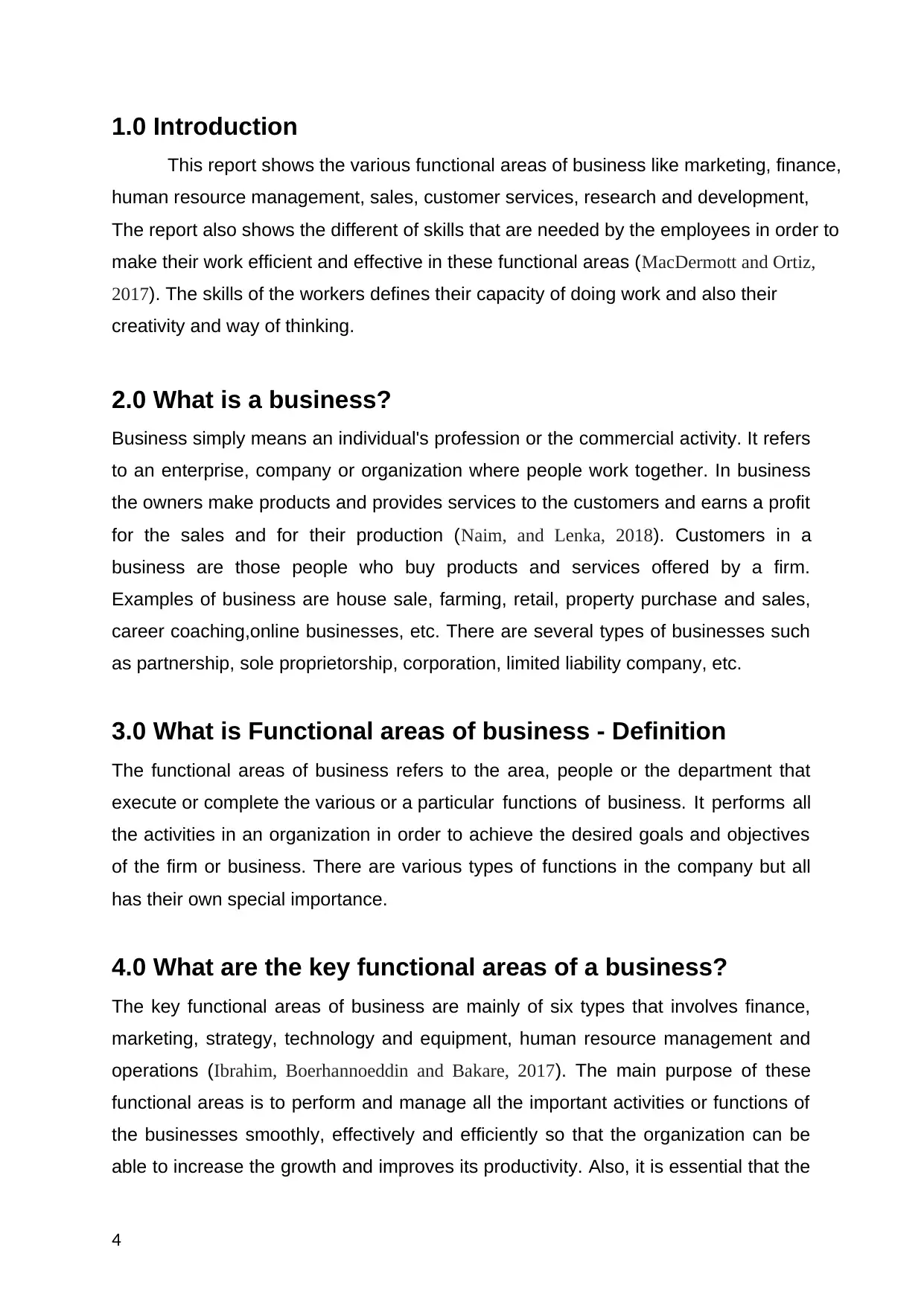
1.0 Introduction
This report shows the various functional areas of business like marketing, finance,
human resource management, sales, customer services, research and development,
The report also shows the different of skills that are needed by the employees in order to
make their work efficient and effective in these functional areas (MacDermott and Ortiz,
2017). The skills of the workers defines their capacity of doing work and also their
creativity and way of thinking.
2.0 What is a business?
Business simply means an individual's profession or the commercial activity. It refers
to an enterprise, company or organization where people work together. In business
the owners make products and provides services to the customers and earns a profit
for the sales and for their production (Naim, and Lenka, 2018). Customers in a
business are those people who buy products and services offered by a firm.
Examples of business are house sale, farming, retail, property purchase and sales,
career coaching,online businesses, etc. There are several types of businesses such
as partnership, sole proprietorship, corporation, limited liability company, etc.
3.0 What is Functional areas of business - Definition
The functional areas of business refers to the area, people or the department that
execute or complete the various or a particular functions of business. It performs all
the activities in an organization in order to achieve the desired goals and objectives
of the firm or business. There are various types of functions in the company but all
has their own special importance.
4.0 What are the key functional areas of a business?
The key functional areas of business are mainly of six types that involves finance,
marketing, strategy, technology and equipment, human resource management and
operations (Ibrahim, Boerhannoeddin and Bakare, 2017). The main purpose of these
functional areas is to perform and manage all the important activities or functions of
the businesses smoothly, effectively and efficiently so that the organization can be
able to increase the growth and improves its productivity. Also, it is essential that the
4
This report shows the various functional areas of business like marketing, finance,
human resource management, sales, customer services, research and development,
The report also shows the different of skills that are needed by the employees in order to
make their work efficient and effective in these functional areas (MacDermott and Ortiz,
2017). The skills of the workers defines their capacity of doing work and also their
creativity and way of thinking.
2.0 What is a business?
Business simply means an individual's profession or the commercial activity. It refers
to an enterprise, company or organization where people work together. In business
the owners make products and provides services to the customers and earns a profit
for the sales and for their production (Naim, and Lenka, 2018). Customers in a
business are those people who buy products and services offered by a firm.
Examples of business are house sale, farming, retail, property purchase and sales,
career coaching,online businesses, etc. There are several types of businesses such
as partnership, sole proprietorship, corporation, limited liability company, etc.
3.0 What is Functional areas of business - Definition
The functional areas of business refers to the area, people or the department that
execute or complete the various or a particular functions of business. It performs all
the activities in an organization in order to achieve the desired goals and objectives
of the firm or business. There are various types of functions in the company but all
has their own special importance.
4.0 What are the key functional areas of a business?
The key functional areas of business are mainly of six types that involves finance,
marketing, strategy, technology and equipment, human resource management and
operations (Ibrahim, Boerhannoeddin and Bakare, 2017). The main purpose of these
functional areas is to perform and manage all the important activities or functions of
the businesses smoothly, effectively and efficiently so that the organization can be
able to increase the growth and improves its productivity. Also, it is essential that the
4
Paraphrase This Document
Need a fresh take? Get an instant paraphrase of this document with our AI Paraphraser
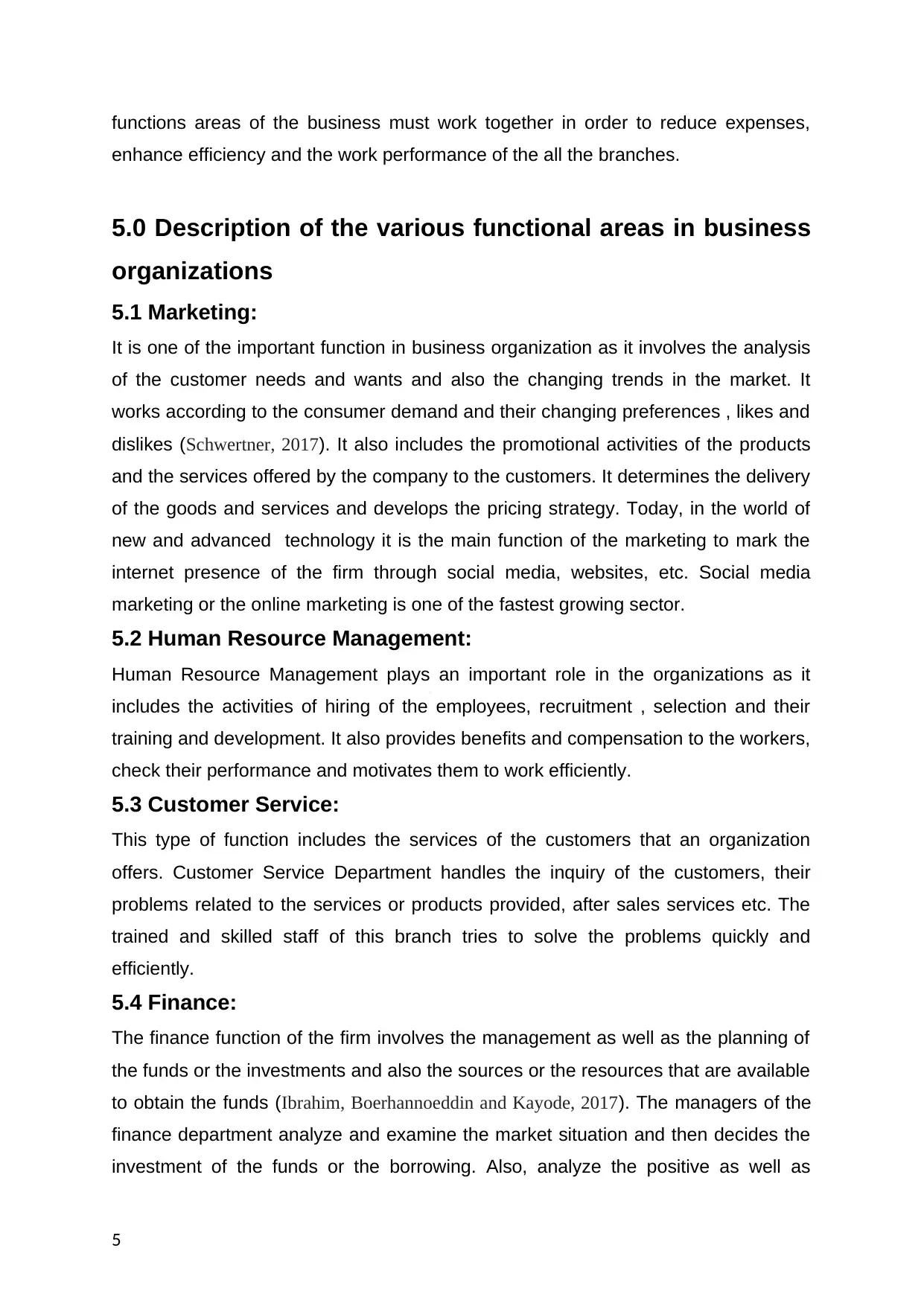
functions areas of the business must work together in order to reduce expenses,
enhance efficiency and the work performance of the all the branches.
5.0 Description of the various functional areas in business
organizations
5.1 Marketing:
It is one of the important function in business organization as it involves the analysis
of the customer needs and wants and also the changing trends in the market. It
works according to the consumer demand and their changing preferences , likes and
dislikes (Schwertner, 2017). It also includes the promotional activities of the products
and the services offered by the company to the customers. It determines the delivery
of the goods and services and develops the pricing strategy. Today, in the world of
new and advanced technology it is the main function of the marketing to mark the
internet presence of the firm through social media, websites, etc. Social media
marketing or the online marketing is one of the fastest growing sector.
5.2 Human Resource Management:
Human Resource Management plays an important role in the organizations as it
includes the activities of hiring of the employees, recruitment , selection and their
training and development. It also provides benefits and compensation to the workers,
check their performance and motivates them to work efficiently.
5.3 Customer Service:
This type of function includes the services of the customers that an organization
offers. Customer Service Department handles the inquiry of the customers, their
problems related to the services or products provided, after sales services etc. The
trained and skilled staff of this branch tries to solve the problems quickly and
efficiently.
5.4 Finance:
The finance function of the firm involves the management as well as the planning of
the funds or the investments and also the sources or the resources that are available
to obtain the funds (Ibrahim, Boerhannoeddin and Kayode, 2017). The managers of the
finance department analyze and examine the market situation and then decides the
investment of the funds or the borrowing. Also, analyze the positive as well as
5
enhance efficiency and the work performance of the all the branches.
5.0 Description of the various functional areas in business
organizations
5.1 Marketing:
It is one of the important function in business organization as it involves the analysis
of the customer needs and wants and also the changing trends in the market. It
works according to the consumer demand and their changing preferences , likes and
dislikes (Schwertner, 2017). It also includes the promotional activities of the products
and the services offered by the company to the customers. It determines the delivery
of the goods and services and develops the pricing strategy. Today, in the world of
new and advanced technology it is the main function of the marketing to mark the
internet presence of the firm through social media, websites, etc. Social media
marketing or the online marketing is one of the fastest growing sector.
5.2 Human Resource Management:
Human Resource Management plays an important role in the organizations as it
includes the activities of hiring of the employees, recruitment , selection and their
training and development. It also provides benefits and compensation to the workers,
check their performance and motivates them to work efficiently.
5.3 Customer Service:
This type of function includes the services of the customers that an organization
offers. Customer Service Department handles the inquiry of the customers, their
problems related to the services or products provided, after sales services etc. The
trained and skilled staff of this branch tries to solve the problems quickly and
efficiently.
5.4 Finance:
The finance function of the firm involves the management as well as the planning of
the funds or the investments and also the sources or the resources that are available
to obtain the funds (Ibrahim, Boerhannoeddin and Kayode, 2017). The managers of the
finance department analyze and examine the market situation and then decides the
investment of the funds or the borrowing. Also, analyze the positive as well as
5
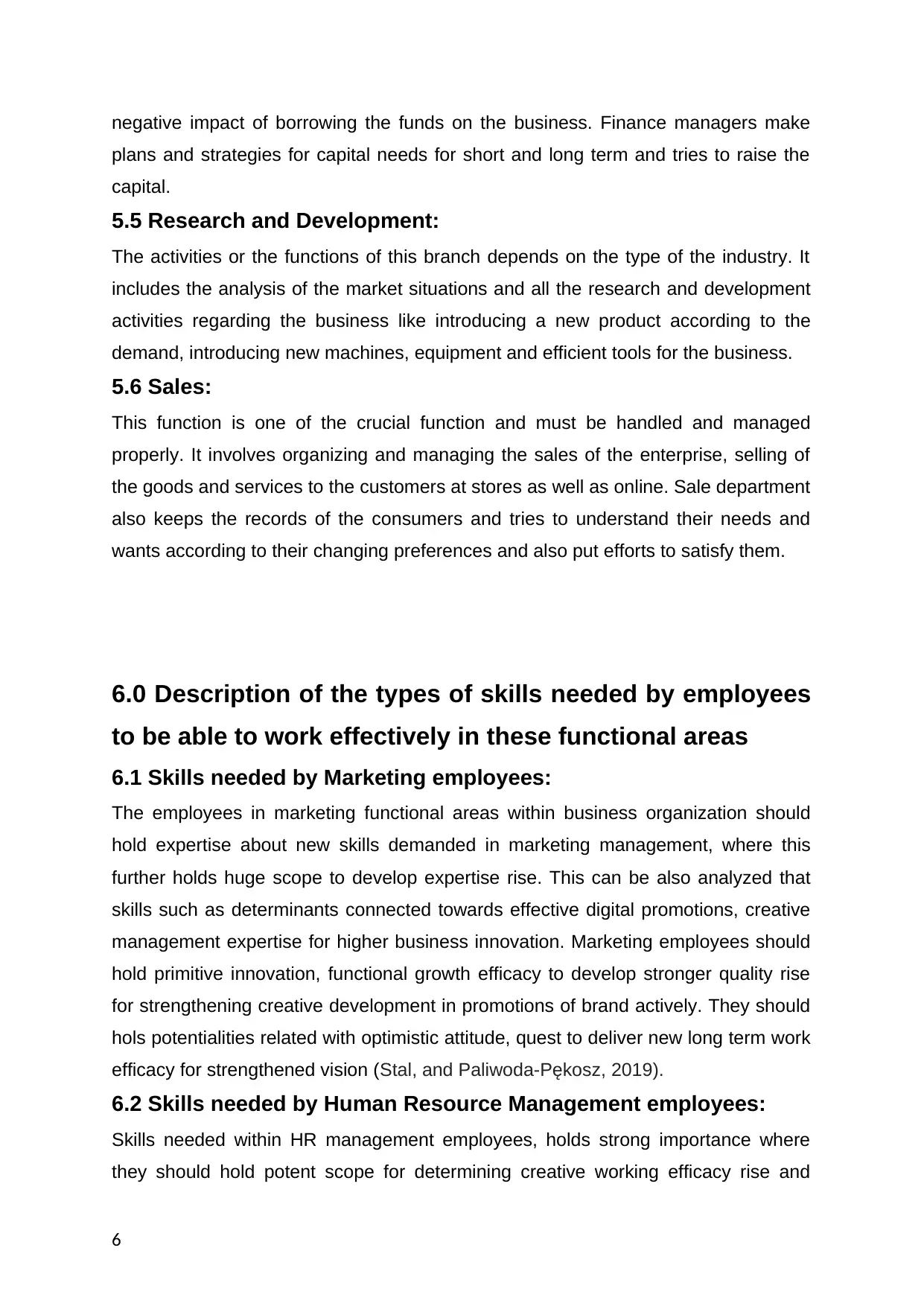
negative impact of borrowing the funds on the business. Finance managers make
plans and strategies for capital needs for short and long term and tries to raise the
capital.
5.5 Research and Development:
The activities or the functions of this branch depends on the type of the industry. It
includes the analysis of the market situations and all the research and development
activities regarding the business like introducing a new product according to the
demand, introducing new machines, equipment and efficient tools for the business.
5.6 Sales:
This function is one of the crucial function and must be handled and managed
properly. It involves organizing and managing the sales of the enterprise, selling of
the goods and services to the customers at stores as well as online. Sale department
also keeps the records of the consumers and tries to understand their needs and
wants according to their changing preferences and also put efforts to satisfy them.
6.0 Description of the types of skills needed by employees
to be able to work effectively in these functional areas
6.1 Skills needed by Marketing employees:
The employees in marketing functional areas within business organization should
hold expertise about new skills demanded in marketing management, where this
further holds huge scope to develop expertise rise. This can be also analyzed that
skills such as determinants connected towards effective digital promotions, creative
management expertise for higher business innovation. Marketing employees should
hold primitive innovation, functional growth efficacy to develop stronger quality rise
for strengthening creative development in promotions of brand actively. They should
hols potentialities related with optimistic attitude, quest to deliver new long term work
efficacy for strengthened vision (Stal, and Paliwoda-Pękosz, 2019).
6.2 Skills needed by Human Resource Management employees:
Skills needed within HR management employees, holds strong importance where
they should hold potent scope for determining creative working efficacy rise and
6
plans and strategies for capital needs for short and long term and tries to raise the
capital.
5.5 Research and Development:
The activities or the functions of this branch depends on the type of the industry. It
includes the analysis of the market situations and all the research and development
activities regarding the business like introducing a new product according to the
demand, introducing new machines, equipment and efficient tools for the business.
5.6 Sales:
This function is one of the crucial function and must be handled and managed
properly. It involves organizing and managing the sales of the enterprise, selling of
the goods and services to the customers at stores as well as online. Sale department
also keeps the records of the consumers and tries to understand their needs and
wants according to their changing preferences and also put efforts to satisfy them.
6.0 Description of the types of skills needed by employees
to be able to work effectively in these functional areas
6.1 Skills needed by Marketing employees:
The employees in marketing functional areas within business organization should
hold expertise about new skills demanded in marketing management, where this
further holds huge scope to develop expertise rise. This can be also analyzed that
skills such as determinants connected towards effective digital promotions, creative
management expertise for higher business innovation. Marketing employees should
hold primitive innovation, functional growth efficacy to develop stronger quality rise
for strengthening creative development in promotions of brand actively. They should
hols potentialities related with optimistic attitude, quest to deliver new long term work
efficacy for strengthened vision (Stal, and Paliwoda-Pękosz, 2019).
6.2 Skills needed by Human Resource Management employees:
Skills needed within HR management employees, holds strong importance where
they should hold potent scope for determining creative working efficacy rise and
6
⊘ This is a preview!⊘
Do you want full access?
Subscribe today to unlock all pages.

Trusted by 1+ million students worldwide
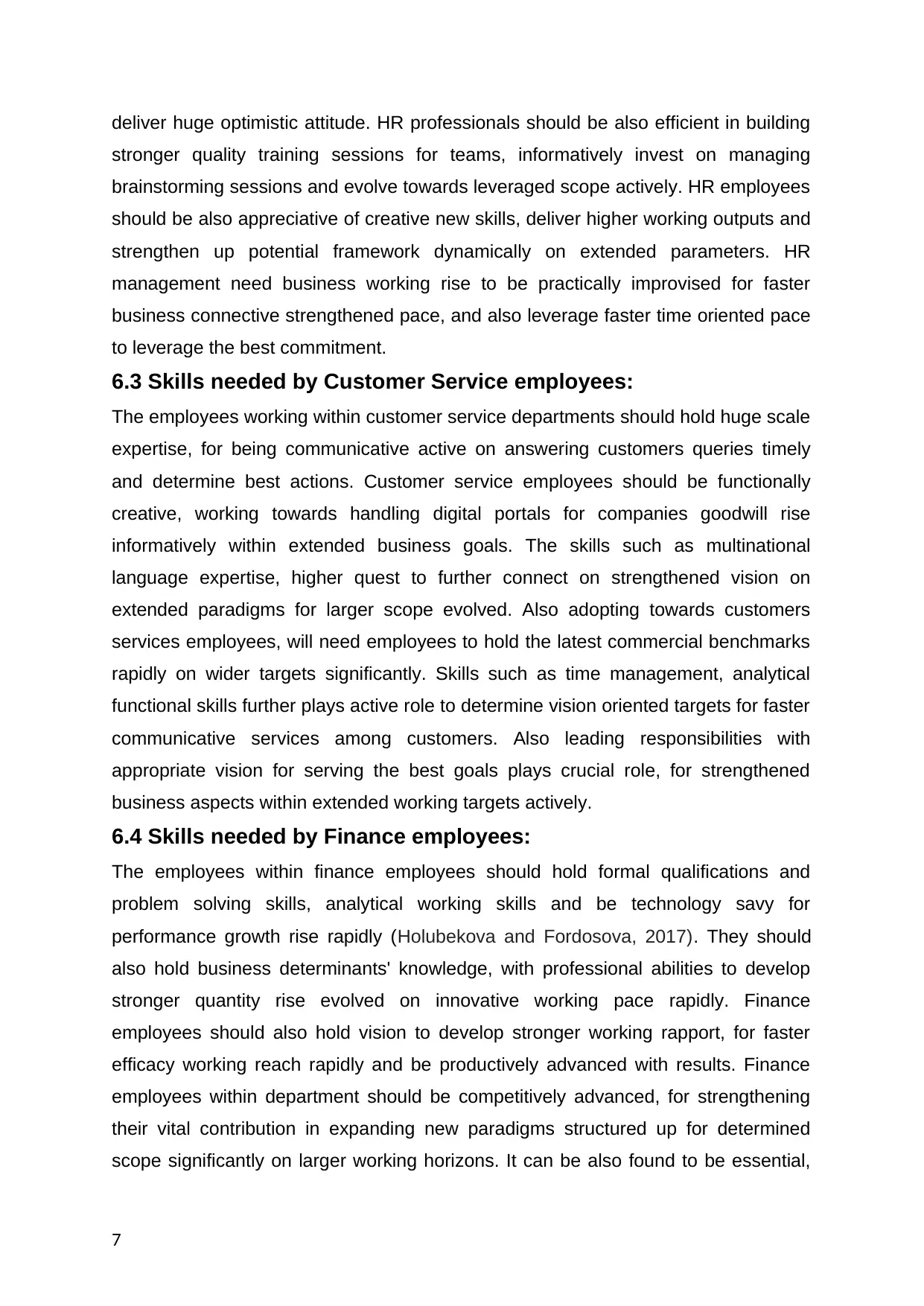
deliver huge optimistic attitude. HR professionals should be also efficient in building
stronger quality training sessions for teams, informatively invest on managing
brainstorming sessions and evolve towards leveraged scope actively. HR employees
should be also appreciative of creative new skills, deliver higher working outputs and
strengthen up potential framework dynamically on extended parameters. HR
management need business working rise to be practically improvised for faster
business connective strengthened pace, and also leverage faster time oriented pace
to leverage the best commitment.
6.3 Skills needed by Customer Service employees:
The employees working within customer service departments should hold huge scale
expertise, for being communicative active on answering customers queries timely
and determine best actions. Customer service employees should be functionally
creative, working towards handling digital portals for companies goodwill rise
informatively within extended business goals. The skills such as multinational
language expertise, higher quest to further connect on strengthened vision on
extended paradigms for larger scope evolved. Also adopting towards customers
services employees, will need employees to hold the latest commercial benchmarks
rapidly on wider targets significantly. Skills such as time management, analytical
functional skills further plays active role to determine vision oriented targets for faster
communicative services among customers. Also leading responsibilities with
appropriate vision for serving the best goals plays crucial role, for strengthened
business aspects within extended working targets actively.
6.4 Skills needed by Finance employees:
The employees within finance employees should hold formal qualifications and
problem solving skills, analytical working skills and be technology savy for
performance growth rise rapidly (Holubekova and Fordosova, 2017). They should
also hold business determinants' knowledge, with professional abilities to develop
stronger quantity rise evolved on innovative working pace rapidly. Finance
employees should also hold vision to develop stronger working rapport, for faster
efficacy working reach rapidly and be productively advanced with results. Finance
employees within department should be competitively advanced, for strengthening
their vital contribution in expanding new paradigms structured up for determined
scope significantly on larger working horizons. It can be also found to be essential,
7
stronger quality training sessions for teams, informatively invest on managing
brainstorming sessions and evolve towards leveraged scope actively. HR employees
should be also appreciative of creative new skills, deliver higher working outputs and
strengthen up potential framework dynamically on extended parameters. HR
management need business working rise to be practically improvised for faster
business connective strengthened pace, and also leverage faster time oriented pace
to leverage the best commitment.
6.3 Skills needed by Customer Service employees:
The employees working within customer service departments should hold huge scale
expertise, for being communicative active on answering customers queries timely
and determine best actions. Customer service employees should be functionally
creative, working towards handling digital portals for companies goodwill rise
informatively within extended business goals. The skills such as multinational
language expertise, higher quest to further connect on strengthened vision on
extended paradigms for larger scope evolved. Also adopting towards customers
services employees, will need employees to hold the latest commercial benchmarks
rapidly on wider targets significantly. Skills such as time management, analytical
functional skills further plays active role to determine vision oriented targets for faster
communicative services among customers. Also leading responsibilities with
appropriate vision for serving the best goals plays crucial role, for strengthened
business aspects within extended working targets actively.
6.4 Skills needed by Finance employees:
The employees within finance employees should hold formal qualifications and
problem solving skills, analytical working skills and be technology savy for
performance growth rise rapidly (Holubekova and Fordosova, 2017). They should
also hold business determinants' knowledge, with professional abilities to develop
stronger quantity rise evolved on innovative working pace rapidly. Finance
employees should also hold vision to develop stronger working rapport, for faster
efficacy working reach rapidly and be productively advanced with results. Finance
employees within department should be competitively advanced, for strengthening
their vital contribution in expanding new paradigms structured up for determined
scope significantly on larger working horizons. It can be also found to be essential,
7
Paraphrase This Document
Need a fresh take? Get an instant paraphrase of this document with our AI Paraphraser
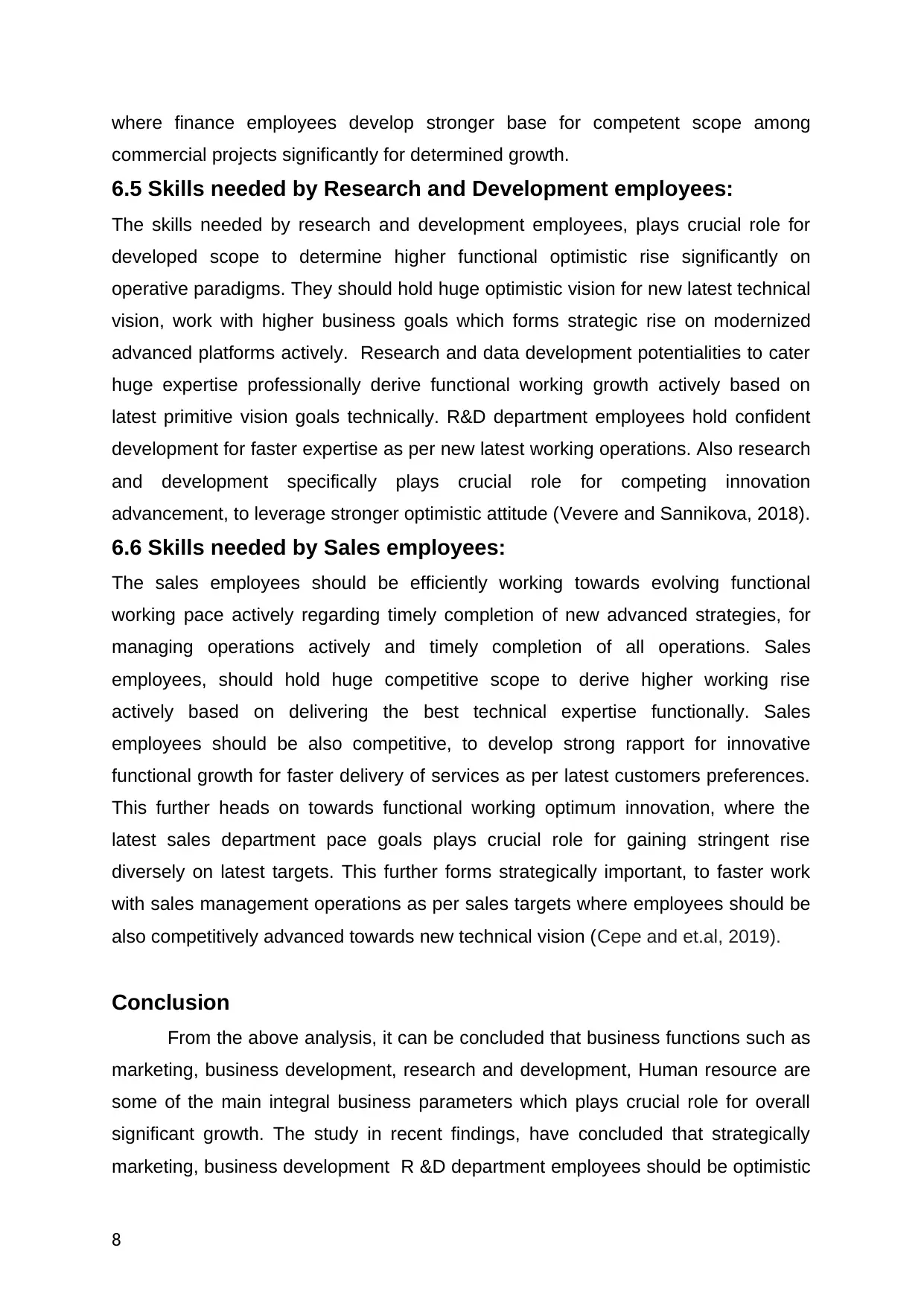
where finance employees develop stronger base for competent scope among
commercial projects significantly for determined growth.
6.5 Skills needed by Research and Development employees:
The skills needed by research and development employees, plays crucial role for
developed scope to determine higher functional optimistic rise significantly on
operative paradigms. They should hold huge optimistic vision for new latest technical
vision, work with higher business goals which forms strategic rise on modernized
advanced platforms actively. Research and data development potentialities to cater
huge expertise professionally derive functional working growth actively based on
latest primitive vision goals technically. R&D department employees hold confident
development for faster expertise as per new latest working operations. Also research
and development specifically plays crucial role for competing innovation
advancement, to leverage stronger optimistic attitude (Vevere and Sannikova, 2018).
6.6 Skills needed by Sales employees:
The sales employees should be efficiently working towards evolving functional
working pace actively regarding timely completion of new advanced strategies, for
managing operations actively and timely completion of all operations. Sales
employees, should hold huge competitive scope to derive higher working rise
actively based on delivering the best technical expertise functionally. Sales
employees should be also competitive, to develop strong rapport for innovative
functional growth for faster delivery of services as per latest customers preferences.
This further heads on towards functional working optimum innovation, where the
latest sales department pace goals plays crucial role for gaining stringent rise
diversely on latest targets. This further forms strategically important, to faster work
with sales management operations as per sales targets where employees should be
also competitively advanced towards new technical vision (Cepe and et.al, 2019).
Conclusion
From the above analysis, it can be concluded that business functions such as
marketing, business development, research and development, Human resource are
some of the main integral business parameters which plays crucial role for overall
significant growth. The study in recent findings, have concluded that strategically
marketing, business development R &D department employees should be optimistic
8
commercial projects significantly for determined growth.
6.5 Skills needed by Research and Development employees:
The skills needed by research and development employees, plays crucial role for
developed scope to determine higher functional optimistic rise significantly on
operative paradigms. They should hold huge optimistic vision for new latest technical
vision, work with higher business goals which forms strategic rise on modernized
advanced platforms actively. Research and data development potentialities to cater
huge expertise professionally derive functional working growth actively based on
latest primitive vision goals technically. R&D department employees hold confident
development for faster expertise as per new latest working operations. Also research
and development specifically plays crucial role for competing innovation
advancement, to leverage stronger optimistic attitude (Vevere and Sannikova, 2018).
6.6 Skills needed by Sales employees:
The sales employees should be efficiently working towards evolving functional
working pace actively regarding timely completion of new advanced strategies, for
managing operations actively and timely completion of all operations. Sales
employees, should hold huge competitive scope to derive higher working rise
actively based on delivering the best technical expertise functionally. Sales
employees should be also competitive, to develop strong rapport for innovative
functional growth for faster delivery of services as per latest customers preferences.
This further heads on towards functional working optimum innovation, where the
latest sales department pace goals plays crucial role for gaining stringent rise
diversely on latest targets. This further forms strategically important, to faster work
with sales management operations as per sales targets where employees should be
also competitively advanced towards new technical vision (Cepe and et.al, 2019).
Conclusion
From the above analysis, it can be concluded that business functions such as
marketing, business development, research and development, Human resource are
some of the main integral business parameters which plays crucial role for overall
significant growth. The study in recent findings, have concluded that strategically
marketing, business development R &D department employees should be optimistic
8
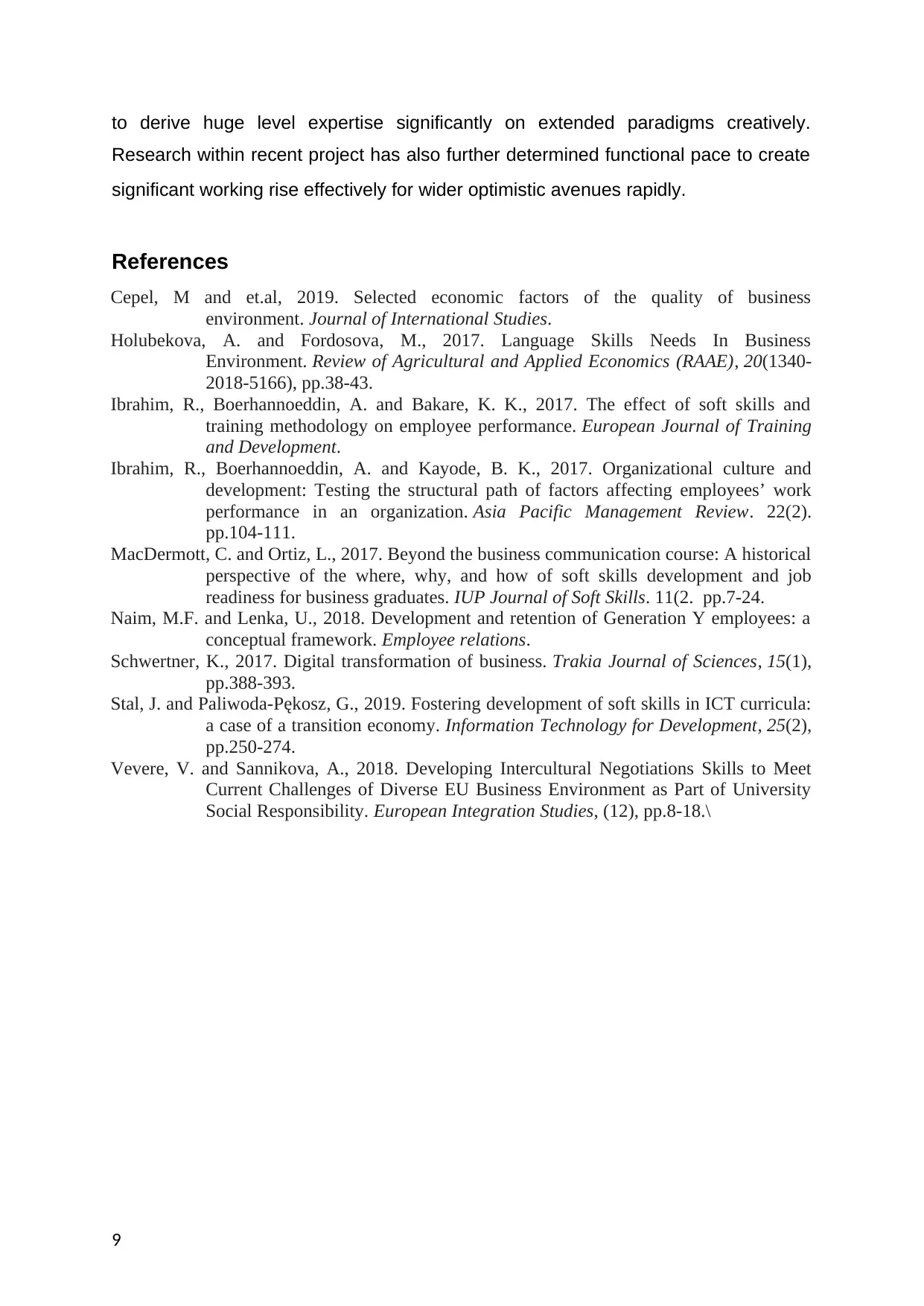
to derive huge level expertise significantly on extended paradigms creatively.
Research within recent project has also further determined functional pace to create
significant working rise effectively for wider optimistic avenues rapidly.
References
Cepel, M and et.al, 2019. Selected economic factors of the quality of business
environment. Journal of International Studies.
Holubekova, A. and Fordosova, M., 2017. Language Skills Needs In Business
Environment. Review of Agricultural and Applied Economics (RAAE), 20(1340-
2018-5166), pp.38-43.
Ibrahim, R., Boerhannoeddin, A. and Bakare, K. K., 2017. The effect of soft skills and
training methodology on employee performance. European Journal of Training
and Development.
Ibrahim, R., Boerhannoeddin, A. and Kayode, B. K., 2017. Organizational culture and
development: Testing the structural path of factors affecting employees’ work
performance in an organization. Asia Pacific Management Review. 22(2).
pp.104-111.
MacDermott, C. and Ortiz, L., 2017. Beyond the business communication course: A historical
perspective of the where, why, and how of soft skills development and job
readiness for business graduates. IUP Journal of Soft Skills. 11(2. pp.7-24.
Naim, M.F. and Lenka, U., 2018. Development and retention of Generation Y employees: a
conceptual framework. Employee relations.
Schwertner, K., 2017. Digital transformation of business. Trakia Journal of Sciences, 15(1),
pp.388-393.
Stal, J. and Paliwoda-Pękosz, G., 2019. Fostering development of soft skills in ICT curricula:
a case of a transition economy. Information Technology for Development, 25(2),
pp.250-274.
Vevere, V. and Sannikova, A., 2018. Developing Intercultural Negotiations Skills to Meet
Current Challenges of Diverse EU Business Environment as Part of University
Social Responsibility. European Integration Studies, (12), pp.8-18.\
9
Research within recent project has also further determined functional pace to create
significant working rise effectively for wider optimistic avenues rapidly.
References
Cepel, M and et.al, 2019. Selected economic factors of the quality of business
environment. Journal of International Studies.
Holubekova, A. and Fordosova, M., 2017. Language Skills Needs In Business
Environment. Review of Agricultural and Applied Economics (RAAE), 20(1340-
2018-5166), pp.38-43.
Ibrahim, R., Boerhannoeddin, A. and Bakare, K. K., 2017. The effect of soft skills and
training methodology on employee performance. European Journal of Training
and Development.
Ibrahim, R., Boerhannoeddin, A. and Kayode, B. K., 2017. Organizational culture and
development: Testing the structural path of factors affecting employees’ work
performance in an organization. Asia Pacific Management Review. 22(2).
pp.104-111.
MacDermott, C. and Ortiz, L., 2017. Beyond the business communication course: A historical
perspective of the where, why, and how of soft skills development and job
readiness for business graduates. IUP Journal of Soft Skills. 11(2. pp.7-24.
Naim, M.F. and Lenka, U., 2018. Development and retention of Generation Y employees: a
conceptual framework. Employee relations.
Schwertner, K., 2017. Digital transformation of business. Trakia Journal of Sciences, 15(1),
pp.388-393.
Stal, J. and Paliwoda-Pękosz, G., 2019. Fostering development of soft skills in ICT curricula:
a case of a transition economy. Information Technology for Development, 25(2),
pp.250-274.
Vevere, V. and Sannikova, A., 2018. Developing Intercultural Negotiations Skills to Meet
Current Challenges of Diverse EU Business Environment as Part of University
Social Responsibility. European Integration Studies, (12), pp.8-18.\
9
⊘ This is a preview!⊘
Do you want full access?
Subscribe today to unlock all pages.

Trusted by 1+ million students worldwide
1 out of 9